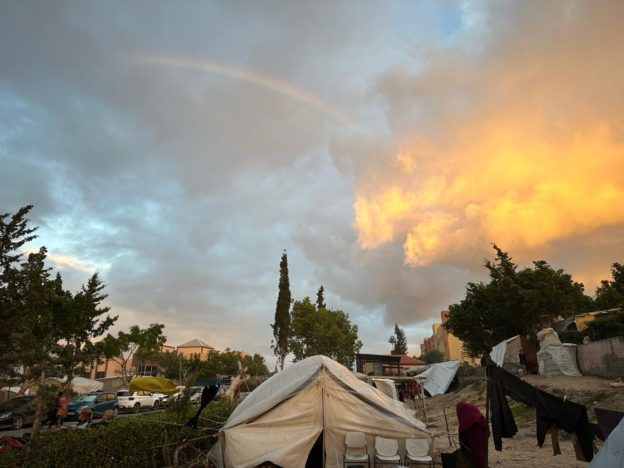Is This Democracy?

Our kids are watching a genocide in real time on social media, and they see the moral bankruptcy of our institutions—government, media, academy, cultural organizations—and they are enraged. Gaza is their Vietnam. Last weekend hundreds of protesters took over the atrium of the Museum of Modern Art in mid-town Manhattan, dropping banners that said FREE PALESTINE and LONG LIVE GAZA. They filled that large hall with chants for freedom and against the corruption of the museum’s trustees. It was a bold, beautiful action and a feat of brilliant organizing. But the U.S.-made and subsidized bombs continue to rain down on Gaza, children are dying, people are starving, and nothing we have done these past months seems to be having an impact on the depraved and cruel slaughter.
On social media, Palestinian poet Mosab Abu Toha wrote, “I don’t know what democracy means for the Western world! Every time we hear Westerners making fun of the Arabs that ‘they don’t have democracy like us!’ That we in the Arab world cannot protest against dictators, etc. Well, I don’t think you in the West have democracy at all. How many times have people taken to the street demanding a ceasefire in Gaza!? What did your western governments do to listen to your democratic action? On the contrary, they never stopped supporting our slaughter with bombs and cash, they hurried to cut funds that attempt to help us in our tents.”

Through We Are Not Numbers, for the past month I have been mentoring Haya Abu Nasser, an extraordinarily talented young Palestinian writer who is internally displaced in Gaza and living in a tent after having been displaced four times. Haya has only intermittent access to the Internet and to electricity, and is under constant threat of bombardment. All of our communication is via WhatsApp messaging, and every morning I check to see if she has answered me, to make sure that she has survived another night. She wrote a beautiful and devastating essay entitled “Surviving Beneath Gaza’s Tempest Skies” about her daily life. I have recently begun submitting her poems to literary magazines. The first fruit of that effort was placing “Remember Our Names” with Scoundrel Time, and this poem was featured in LitHub Daily on 6 February. Since then we have placed two poems with Evergreen Review and one with Guernica for upcoming publication.
As the heart breaks and breaks again watching a horrific genocidal campaign against the Palestinians of Gaza, a campaign that has the full-throated support of the Biden Administration (ignore the bleating complaints and look at the weapons and cash being sent to keep the murder machine running), my best hope is our solidarity and witness. Read this nuanced and melancholy piece by my friend Mashinka Firunts Hakopian about Armenian-Palestinian solidarities. Don’t look away from Gaza. Don’t stop speaking out for Palestine. As Vasily Grossman put it in his magisterial World War II novel Life and Fate, “Human history is not the battle of good struggling to overcome evil. It is a battle fought by a great evil, struggling to crush a small kernel of human kindness. But if what is humane in human beings has not been destroyed even now, then evil will never conquer.”
Nancy Kricorian
February 20, 2024
